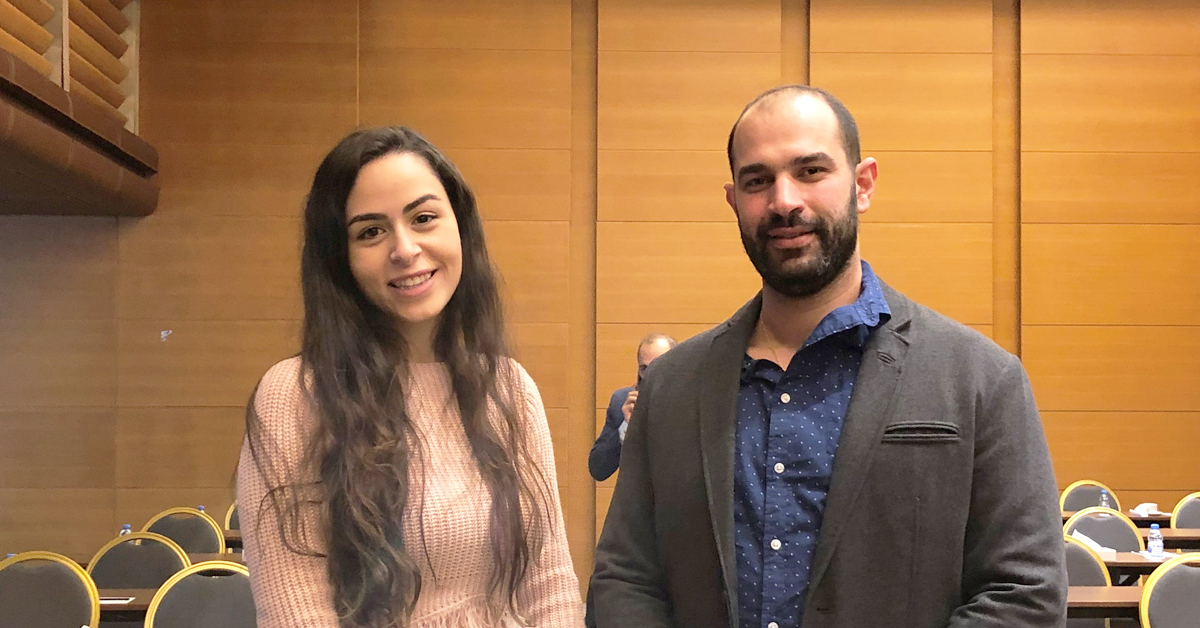Drive Green is a startup that aims to provide an alternative transportation scheme for delivery businesses consisting of an electric motorcycle and energy on demand.
Founders, Christelle Bou Harb & Emilio El Hajj joined the NEX-LABS program to develop their solution, triggered by the series of gasoline crises occurring in Lebanon and worldwide and their impact on Lebanese society. Here’s the journey of the two engineering students who turned their thesis into a startup.
Q: How does your solution work? A: Drive Green provides businesses with delivery services with a reliable, green, and cheap replacement for their gasoline engines. The process is quite simple: a company can purchase a monthly bundle from us. This bundle will give them access to an electric motorcycle and its maintenance services. Additionally, once the driver’s battery is low, they will have access twice per day to our swapping stations. Once there, our team will swap their battery and give them a charged one in minimal time.
Q: What makes your solution unique?
A: Drive Green’s solution is unique compared to others due to the economic, environmental, and practical impacts that it delivers. First, price-wise, the bundle that Drive Green is offering helps businesses save up to 20% on what they pay for the maintenance and gasoline of their usual engines. Then, it is important to note that our charging will mostly rely on renewables. This makes us more reliable than gasoline engines and even more reliable than electric vehicles that charge from the grid/generator since we are less affected by fuel crises. Additionally, this gives us a better environmental impact since this scheme will help save up to 4tCO2/motorcycle/year. Finally, the swapping mechanism, along with our management algorithm that ensures an uninterrupted workflow, increases the productivity of the businesses compared to when they are using other electric vehicles since it spares them the typical 5-hour charging wait.
Q: Who is benefitting from your solution?
A: The price of gasoline is taking a toll on the economy and the environment. The electric shift is happening worldwide, and we are proud to be accelerating it in Lebanon. We are still in the pilot phase. The ones who will directly benefit from our services are companies having to go long distances or those who want to feed into their CSR, including those with delivery and e-commerce services.
Q: How is your solution relevant to your sector and Lebanon?
A: Our solution is directly related to the energy sector. In fact, through this scheme, we are promoting alternative green energies and the importance of energy management. Lebanon is going through an economic crisis. Gasoline and the use of fossil fuels are at the heart of these problems. Additionally, the country failed to meet the environmental goals it had set for COP27. Our solution will diminish these problems. In the short term, we are economically benefiting our customers and users while raising awareness of the importance of electric vehicles and renewable energy usage. In the mid-term, through the environmental impact we are having, we are helping Lebanon achieve its NDCs. Finally, in the long term, diminishing environmental impacts will have a positive impact on health.
Q: Why did you apply to the NEX-LABS program? What were you hoping to achieve?
A: From an engineering background’s perspective, we are always looking to expand our knowledge in the interconnected pillars of entrepreneurship such as business, economy, and strategy. Consequently, we consider contacts and mentorship to be two of the most important success factors in our journey. Seeing a program that is relevant to our sector and that will be able to extend our network in the MENA region made us highly interested in it. While applying, we hoped to meet mentors and people who had “been there” to advise us on our decisions and strategies.
The program didn’t deceive us in any way. We had access to experts who helped us from a strategic, economic, and engineering point of view. The connections that we developed added to the learning curve, which we think is priceless.
Q: What did you achieve so far? What are your key success factors?
A: We’ve already established our prototype, tested it, and secured 3 LOIs. We are at the final stages of our pilot plan design. There are five main factors that we think are crucial: passion, teamwork, connections, time management, and knowledge.
Q: If you had to choose one achievement to highlight, what would it be and what lessons did you learn from it?
A: We would choose the design of our pilot plan. This experience has turned our ideas into concrete concepts. Additionally, it helped us increase our engineering practical knowledge along with our economic and business ones. Finally, it put us in direct contact with our early adopters while pushing us to meet with stakeholders who shared the same values as us.
Q: What are the main challenges that you have faced so far?
A: There were two main challenges faced. The first one is the country’s political state which induces delays in hardware imports and legal matters. Then, access to funds is something we are struggling with as well. The first one is overcome by being persistent and transparent with our stakeholders. The second one is through resorting to entrepreneurship programs that provide monetary support to startups
Q: What is one thing you would have done differently throughout your journey?
A: Both of us are from engineering backgrounds. Therefore, a lot of the activities that we are engaging in require us to go out of our comfort zone. Looking back, we would’ve advised ourselves to act faster and not to be afraid to fail since it is inevitable and key to any success.
Q: Have you ever thought of giving up on your venture? If yes, what made you pull through?
A: Honestly, yes. However, we were always there to remind each other why we started, which kept us going and true to our mission.
About NEX-LABS
NEX-LABS project is co-funded by the European Union under the ENI CBC Mediterranean Sea Basin Programme and has the ambitious goal to set up a long-term regional policy of the Mediterranean Strategy for Sustainable Development.










